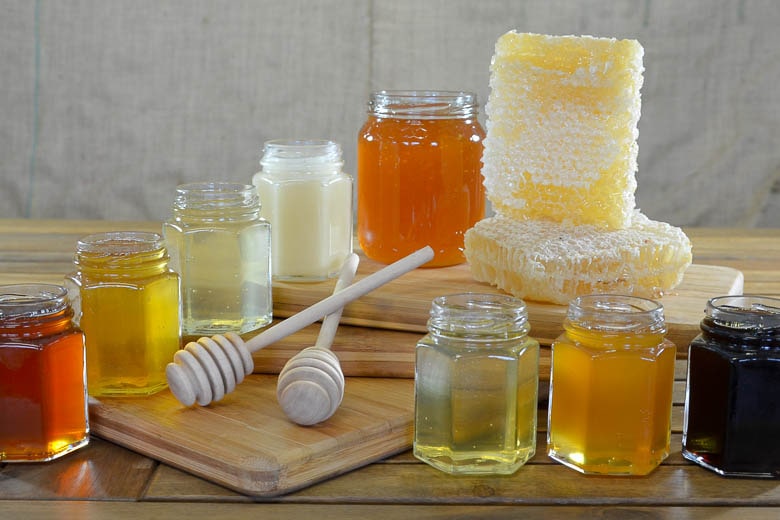Collapsible content
How should honey be stored?
Honey is a very robust food product, and if stored properly, will last years if not decades. In fact, honey has been found perfectly preserved in tombs of the Pharaohs in Egypt.
The quality of honey may be damaged by the following factors:
Excessive moisture
Ideally the moisture content of honey should be less than 17.8%. If the moisture content is too high, say greater than 20%, the honey may ferment due to yeasts in the honey. Since honey is hygroscopic, if it is not in a sealed container, it will attract moisture from the air.
Excessive heat
Honey loses many of its’ health benefits with the combination of heat and time. The following is a rule of thumb storage time vs temperature to retain most of its’ health benefits:
- 40 C for 30 days
- 30 C for 6 months
- 20 C for 4 years1
- 0 C for 35 years
Prolonged exposure to sunlight
Honey loses many of its’ health benefits with prolonged exposure to sunlight.
Noxious elements in its environment
Honey is hygroscopic and takes on odours from its environment. It is also acidic, so it can dissolve metal if stored in metal containers.
Honey Storage Guidelines
- Store honey in a sealed, food-grade, non-metallic container.
- For normal use, store the container in a cupboard (away from direct sunlight) at room temperature (21 C).
- For prolonged storage of honey (> 4 years), store at refrigerator temperature (4 C).
Can honey be fed to infants?
The bacterium, Clostridium botulinum is very common in nature and may be found in any raw food.
A fully developed digestive system will protect a person against ingested C. botulinum. However, the digestive system of an infant under the age of 12 months is not fully developed, and thus cannot deal with many kinds of antigens, including C. botulinum. The toxins produced by C. botulinum are extremely dangerous and present a very serious condition for infants.
It is extremely rare to find C. botulinum in honey, but there have been a hand full of documented cases over the last 40 years. In these cases it is thought that the bacteria came in contact with the honey somewhere during honey processing.
“Honey is a raw food and is NOT recommended for infants less than 12 months of age”
Due to honey’s bacteriostatic properties, bacteria, including C. botulinum, will not grow nor produce toxins in honey ! C. botulinum spores are very resilient and can withstand harsh conditions, including the honey pasteurization process. If an infant were to ingest honey that was contaminated with C. botulinum spores, the honey would become diluted in the infant’s intestinal tract, and the spores would have suitable conditions to be activated, thus providing the conditions for botulism.
“The honey pasteurization process does NOT destroy C. botulinum spores in honey!”
Is honey sticky?
Yes!
Does honey help relieve coughs?
A study conducted at Penn State in 2007 compared Buckwheat honey, honey flavoured Dextromethorphan (DM) and no treatment (control) as a cough suppressant. The results concluded that Buckwheat honey scored highest in all categories for the relief of nocturnal cough and sleep difficulty due to upper respiratory tract infection in children ages 2 to 18.
“Buckwheat honey was found to be superior to Dextromethorphan as a cough suppressant”

